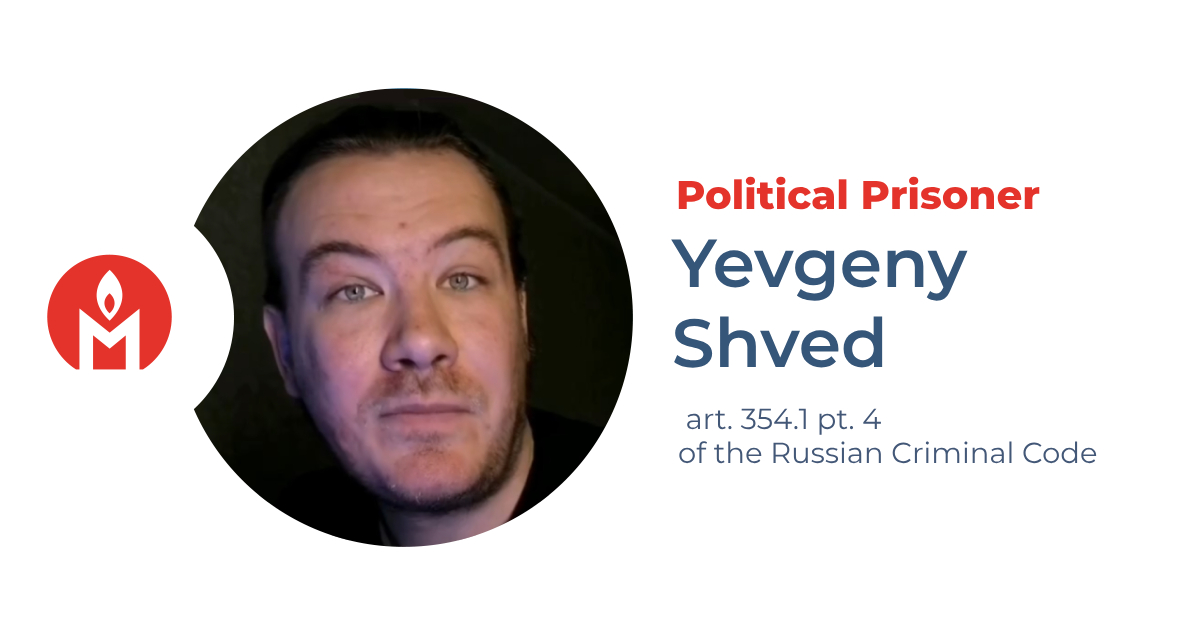Yevgeny Shved is a political prisoner
A Crimean has been sentenced to 30 months’ imprisonment for an emotional post about Victory Day
The ‘Political Prisoners. Memorial’ human rights project, in accordance with international standards, considers Yevgeny Shved a political prisoner. Shved has been convicted on a charge of rehabilitating Nazism for a publication on Telegram. Shved’s criminal prosecution and conviction violated his rights to freedom of expression and fair trial. We demand the immediate release of Yevgeny Shved and that all criminal charges against him be dropped.

What are the charges against Yevgeny Shved?
On 9 May 2023, Yevgeny Shved, a resident of Russian-occupied Crimea, wrote on his Telegram channel to his 129 subscribers that the celebration of Victory Day in the Russian Federation had turned into a ‘vile pseudo-holiday’ and that veterans were now ‘not needed by anyone and forgotten.’ Shved’s post also stated: ‘World War II was unleashed by the Soviets and Germany by a pact dividing up Europe between the two imperialist cattle Stalin and Hitler, and by the Soviet attack on Finland.’
The Telegram channel Crimean SMERSH subsequently denounced Shved for his post and law enforcement officials initiated a criminal investigation. Shved was charged with two offences related to the rehabilitation of Nazism: denial of the facts established by the verdict of the International Military Tribunal in Nuremberg (Article 354.1, Part 2, of the Russian Criminal Code), and dissemination of information expressing obvious disrespect to society about the days of military glory of Russia (Article 354.1, Part 4).
As a result of a plea bargain, Shved pleaded guilty, and his case was heard under a special procedure. On 27 February 2024, a Russian-controlled court in Crimea sentenced Yevgeny Shved to 30 months’ imprisonment in a general-regime penal colony.
Why do we consider Shved a political prisoner?
The article criminalising ‘rehabilitation of Nazism’ unreasonably restricts freedom of expression. The provisions of this article criminalise opinion about past events, prohibit criticism of official symbols, and outlaw statements critical of the leadership of the USSR.
Shved’s post about the 9 May celebrations in Russia was directed not against Victory Day itself, but against the forms of its celebration. It contained an exclusively emotional evaluation and did not ‘disseminate false information’ or question specific facts.
While Shved’s post mentioned the Molotov-Ribbentrop Pact, the existence of this Pact is common knowledge, and the Nuremberg Tribunal did not comment upon it. Therefore, the charge of denying facts established by the verdict of this Tribunal is untenable.
In violation of both Russian and international law guaranteeing freedom of expression, Shved was prosecuted and convicted solely for expressing an opinion contrary to official ideology.
A detailed description of Yevgeny Shved’s case and of our position is available on our website.
Recognition of an individual as a political prisoner does not imply the ‘Political Prisoners. Memorial’ human rights project agrees with, or approves, their views, statements, or actions.
How can you help?
You can write to Yevgeny Shved at the following address:
In Russian: 295006, Республика Крым, г. Симферополь, бул. Ленина, д. 4, ФКУ СИЗО-1 УФСИН России по Республике Крым и г. Севастополю, Шведу Евгению Викторовичу 1992 г. р.
In English: Yevgeny Viktorovich Shved (born 1992), Pre-Trial Detention Centre No. 1, Federal Penitentiary Service of Russia for the Republic of Crimea and the city of Sevastopol, 4 Lenina Boulevard, Simferopol, Republic of Crimea, Russia, 295006
You can send an email via F-Pismo and ZT (for payment with Russian bank cards), PrisonMail (for payment with other bank cards), or OVD-Info and Memorial-France (free of charge).
Please note that letters in languages other than Russian are highly unlikely to reach the recipient.
We respect the sovereignty and territorial integrity of Ukraine. At the same time, we believe it important to keep in touch with those in a particularly vulnerable situation and currently deprived of freedom on the Russian-occupied territories of Ukraine. In order for letters to reach those to whom they are written, we provide postal addresses in accordance with Russian regulations.
You can donate to support all political prisoners in Russia.
